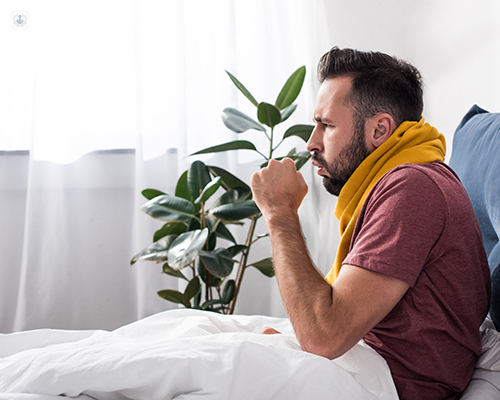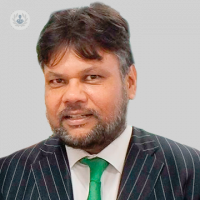Coronavirus: symptoms, diagnosis and prevention
Written by:With the coronavirus officially being declared a pandemic by the World Health Organisation (WHO), you may be feeling very nervous about how it will continue to progress. Whilst we can’t fully predict the future, we can recognise that some things are for certain, such as the symptoms that present, including fever, a dry cough and a general feeling of being unwell.
In most people, the manifestation of coronavirus is mild, but there are a few important steps that you can take to prevent yourself from catching the virus and from passing it onto others.
Dr Syed Husain is a leading consulting respiratory physician and an honorary senior clinical lecturer at King’s College London. He is currently on the frontline when it comes to managing patients with suspected coronavirus, or dealing with patients requiring admission to hospital with corona virus-related pneumonias, or respiratory problems in the UK.
Dr Husain has kindly taken the time to explain everything that he knows about the virus so far; from symptoms, diagnosis and prevention, to sharing his overall professional advice.

What can you tell us about the coronavirus?
Coronavirus (COVID-19) is a new strain of virus that was first identified in Wuhan City, China in January 2020. A coronavirus is a type of single-strand RNA virus. As a group, coronaviruses are common and known across the world.
The incubation period of COVID-19 is between two and 14 days. This means that if a person remains well 14 days after contact with someone with confirmed coronavirus, the disease is not transmitted.
What are the symptoms of coronavirus?
The following symptoms may develop within the 14-days after exposure to someone who has COVID-19 infection. The commonest signs include:
- Cough
- Fever
- Difficulty in breathing
- Fatigue
Less common symptoms of COVID-19 include:
- Sputum (mucus) production
- Muscle or joint pain
- Sore throat
- Headache
- Chills
- Nasal congestion
- Diarrhoea
- Blood when coughing
- Conjunctival congestion
The most severe symptoms, including pneumonia, affect people with a weakened immune system, such as the elderly and those with pre-existing long-term conditions like diabetes, cancer or chronic lung disease, including anyone who gets a flu vaccine yearly. These patients may require hospitalisation.
How is coronavirus spread?
From what we know about other coronaviruses, the spread of COVID-19 is most likely to happen when there is close contact (within 1-2 metres distance) from an infected person. It is likely that the risk increases the longer that someone has close contact with someone carrying the virus.
Droplets, termed respiratory secretions, are produced when an infected person coughs or sneezes. This is likely to be the most important means of transmission.
It is also possible that someone may become infected by touching a surface or object that has been contaminated with respiratory secretions and then touching their own mouth, nose and eyes. For example, someone might touch a doorknob or shake hands with someone who is infected and then touch their own face.
The virus can survive on surfaces from a few hours to days, so cleaning and disinfectants are useful. The best strategy, however, is cleaning your hands thoroughly with soap and water, which is very important.
How can we prevent the spread of infection?
Currently, as this article was published in March 2020, there is no vaccine to prevent COVID-19. We can, however, help to prevent the spread of the respiratory virus by:
- Washing your hands often and for more than 20 seconds with soap and water.
- Use of hand sanitiser (60% alcohol) if handwashing facilities are not available, which is particularly important after using public transport.
- Do NOT touch your face, eyes and mouth.
- Avoid handshaking and greeting people closely, which is known as social distancing.
- Cover your mouth or nose if you cough or sneeze with a tissue and dispose of the tissue in the bin or down the toilet. (Catch it, bin it, kill it!)
- If you feel unwell you should at stay home and do not attend work or any education or childcare setting for at least seven days.
- Avoid close contact with people who are unwell. Again, follow social distancing and avoid visiting friends for social meetings.
- Avoid social gatherings in public places.
- Clean and disinfect frequently-touched objects and surfaces.
Pupils, students, staff and visitors should wash their hands:
- Before leaving home
- On arrival at school
- After using the toilet
- After breaks and sporting activities
- Before food preparations
- Before eating any food, including snacks
- Before leaving school
Most importantly, everyone should adhere to the following:
- Avoid travel to countries with COVID-19 cases.
- Avoid public places and gatherings.
- No cruise ship travels, especially for the elderly and the venerable adults
How is coronavirus diagnosed by a doctor?
When a doctor suspects COVID-19, they take sample swabs from the nose, throat and deeper respiratory samples, which are then packaged and sent safely to a laboratory. Public Health England can provide a result from this specific virus on the same working day. In a hospital setting, test results are back within 48-hours.
Sometimes a CT scan of the chest could show evidence of bilateral ground-glass shadowing, which is the image of pneumonia. There are other blood tests that could be indicative of COVID-19.
How can we stop spreading coronavirus?
It is incredibly important to practice good respiratory and hand hygiene. Face masks for the general public are NOT recommended to protect them from infection as there is no evidence of benefit from their use outside of healthcare environments.
Healthcare personnel should use a face mask that is fitted-to-size and respirators would be more useful, especially to healthcare workers with beards or failing fit testing. In order to stop spreading COVID-19, it is important to also:
- Follow the rules of social distancing - stand 2m away from each other
- Self-isolate for two weeks - if any symptoms appear
- Avoid public gatherings - including religious places, pubs or going to the gym
- Do not use any social or intimate actions - no shaking hands or social hugging
- School, college or university gatherings should be closed.
We have to reiterate the importance of regular cleaning of the hands with soap and water for 20 seconds and to use hand sanitisers with 60% alcohol if soap and water are not available.
How can other healthcare professionals take care when it comes to coronavirus?
Healthcare workers whose possible exposures do not require exclusion from work should be advised. They should:
- Continue to practice or work as normal while asymptomatic.
- Monitor their own health and make contact with the healthcare service by calling 111, or their direct point of contact, if they become unwell.
- Inform occupational health and their line manager if symptomatic and need to be excluded from work.
If you are worried about your symptoms, or those of a child or colleague, please call the NHS on 111. Do not go directly to your GP or other healthcare environments.
Dr Syed Husain is a highly-experienced physician who holds a specialist interest in respiratory diseases, including asthma, lung cancer and pulmonary fibrosis. You can book an appointment with Dr Husain via his Top Doctor’s profile if you are living with any of these conditions and would like his expert advice. Please do not book an appointment if you think you have symptoms of coronavirus and call the NHS 111 phone number instead.
Acknowledgement: I would like to acknowledge the work of Syed Ammar Husain Medical Student from Hull & York Medical school for his help in formulating this useful article
If you are currently in self-isolation or practising social distancing and need to speak to a medical specialist, you can speak to a doctor using our remote e-Consultation service. Find out more here.



